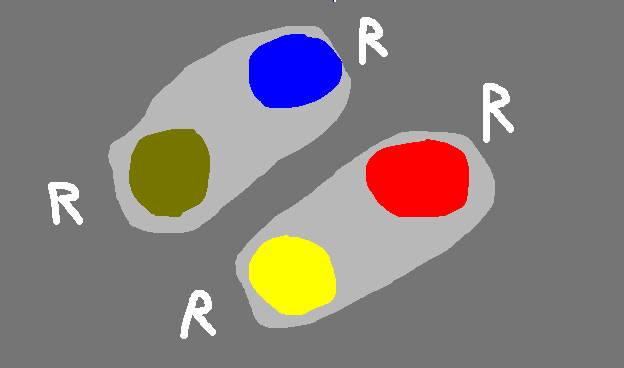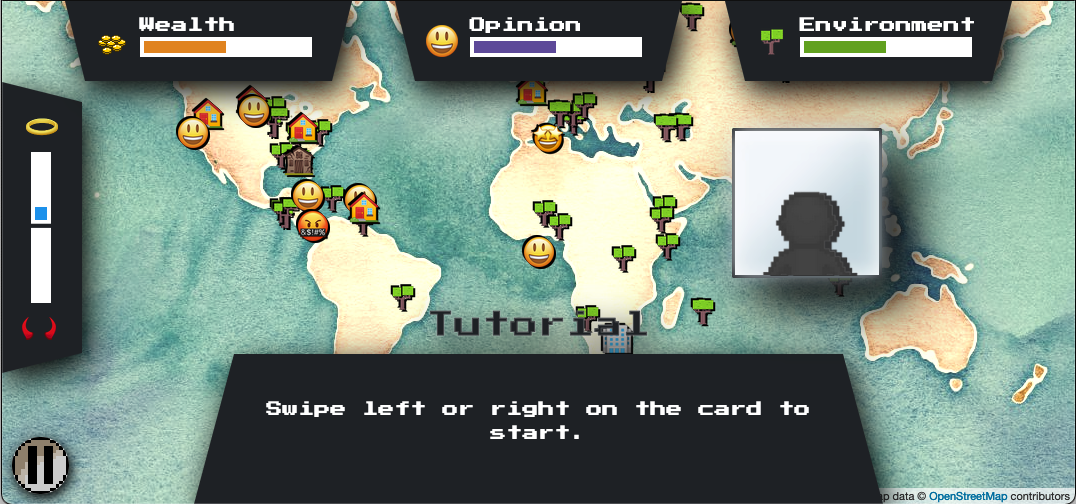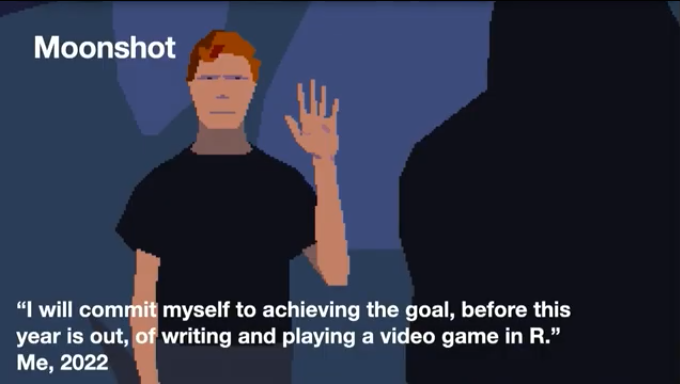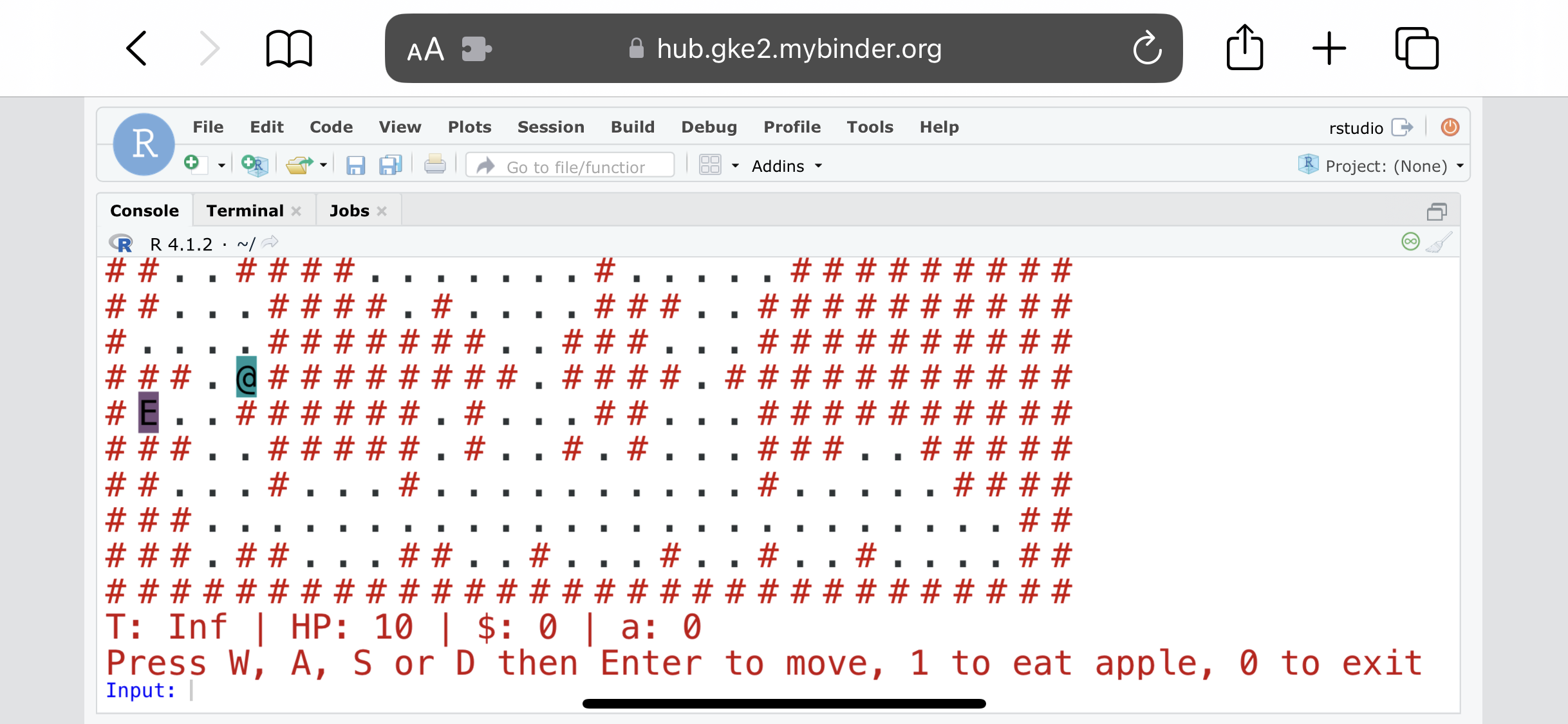
tl;dr
R is ‘a free software environment for statistical computing and graphics’. Ahahaha, no it’s not, it’s a game engine. I’ve created a ‘splendid’ list of games you can play—written in R—to prove it. Help expand it.
Stats only!
R is not a general, multi-purpose programming language. It was written to do statistical analysis and make charts. You are literally not allowed to do anything else with it. You should use <LANGUAGE> instead, which is much more suited to your specific use case. R is a joke language for nerds.
You should not read beyond this point if you think, quite rightly, that mirth and frivolity are unsuited to an R session.
Stats only?
Unity. Unreal. GameMaker. Godot. All of these videogame engines are now obsolete.
It is R—humble R!—that represents the future of gaming.
To prove it, I’ve created a list of ‘splendid R games’ in a GitHub repo1 that you are welcome to contribute to.2
Yes, R can be used for fun. Do not tell R Core.
Wait, he’s serious?
I think there’s three kinds of ‘platform’ for games written in R:
- For the console
- In Shiny
- Ported
Games played in the console are pretty straightforward and probably most common. You can run some code, or a function from a package, to launch some code in the R console that you can interact with. A simple option for this might involve use of readline() to receive user input, for example, like Giora Simchoni’s excellent text-based puzzler, Castle of R.

Giora’s Castle of R running in the terminal.
Shiny can give you a little more flexibility when it comes to graphics and user input, at the expense of needing to host the app and maybe some extra JavaScript skills. A great example of this is Pedro Silva’s winning entry (app, source) to the Posit Shiny contest in 2020.

A still from Pedro’s Shiny Decisions app.
The third category is a little more boundary-pushing. Imagine if R was powerful enough to let you port existing games. Well, surprise, ya boi Mike Cheng (aka coolbutuseless) has pushed hard on expanding the capabilities of R to run fast enough and with realtime user input,3 porting the classic Another World (1991) to R, which was showcased at 2022’s Posit conference (source, video, blog).

A still from Mike’s rstudio::conf(2022) presentation, featuring Another World.
Of course, within these ‘platforms’ are genres like word games, arcade games, puzzle games, etc. Will you be the first to create an MMORPG (a massively-multiplayer online R-powered game)?
I am an indie game dev now
I’ve always been interested in how videogames are coded,4 wishing that I could do the same myself. Of course I could simply learn ‘real’ programming languages.
Except that’s blasphemy. Of course I’d rather break my own mind and spirit in an attempt to make R achieve 0.1% of what might be possible in P*thon.
Case in point, I’ve made a few R packages containing some little toys (in order of gooddest to baddest):
- {r.oguelike} (source, blogs) for a procedural-dungeon explorer with enemy pathfinding and inventory
- {tamRgo} (source, blog) for a cyber pet in your R console that persists between sessions
- {safar6} (source, blog) for a text-based re-make of the Safari Zone from the first generation of Pokémon games
- {ActionSquirrel} (source, blog) for a tile-based, turn-based minigame in the R console
- {hokey} (source, blog) for minigames that use direct keypress inputs with {keypress}

Hint when playing {tamRgo}: do not forget about your pet for 138 days. RIP Kevin XVIII.
I’ve got something in the pipeline that involves extremely rudimentary physics in the R console. Wow! For release in 2023 (because game launches never go wrong).
Ready Player 2
The splendid list must be missing a bunch of games. Please leave an issue or pull request in the splendid-r-games repo to add more examples.
Next stop: letting people run R games in the browser without an installed copy of R. This is already possible with a service like Binder, which can spin up an instance of RStudio with packages pre-installed I did this for {r.oguelike}).

Just like the Nokia N-Gage, amirite?
But soon you might be able to use WebR to play games in the browser without even spinning up RStudio, ooh. So look out for an R version of itch.io in future, lol.
Session info
## ─ Session info ───────────────────────────────────────────────────────────────
## setting value
## version R version 4.2.0 (2022-04-22)
## os macOS Big Sur/Monterey 10.16
## system x86_64, darwin17.0
## ui X11
## language (EN)
## collate en_US.UTF-8
## ctype en_US.UTF-8
## tz Europe/London
## date 2023-04-18
## pandoc 2.19.2 @ /Applications/RStudio.app/Contents/Resources/app/quarto/bin/tools/ (via rmarkdown)
##
## ─ Packages ───────────────────────────────────────────────────────────────────
## package * version date (UTC) lib source
## blogdown 1.9 2022-03-28 [1] CRAN (R 4.2.0)
## bookdown 0.26 2022-04-15 [1] CRAN (R 4.2.0)
## bslib 0.3.1 2021-10-06 [1] CRAN (R 4.2.0)
## cli 3.6.0 2023-01-09 [1] CRAN (R 4.2.0)
## digest 0.6.31 2022-12-11 [1] CRAN (R 4.2.0)
## evaluate 0.20 2023-01-17 [1] CRAN (R 4.2.0)
## fastmap 1.1.0 2021-01-25 [1] CRAN (R 4.2.0)
## htmltools 0.5.2 2021-08-25 [1] CRAN (R 4.2.0)
## jquerylib 0.1.4 2021-04-26 [1] CRAN (R 4.2.0)
## jsonlite 1.8.4 2022-12-06 [1] CRAN (R 4.2.0)
## knitr 1.42 2023-01-25 [1] CRAN (R 4.2.0)
## R6 2.5.1 2021-08-19 [1] CRAN (R 4.2.0)
## rlang 1.0.6 2022-09-24 [1] CRAN (R 4.2.0)
## rmarkdown 2.14 2022-04-25 [1] CRAN (R 4.2.0)
## rstudioapi 0.14 2022-08-22 [1] CRAN (R 4.2.0)
## sass 0.4.1 2022-03-23 [1] CRAN (R 4.2.0)
## sessioninfo 1.2.2 2021-12-06 [1] CRAN (R 4.2.0)
## xfun 0.37 2023-01-31 [1] CRAN (R 4.2.0)
## yaml 2.3.7 2023-01-23 [1] CRAN (R 4.2.0)
##
## [1] /Library/Frameworks/R.framework/Versions/4.2/Resources/library
##
## ──────────────────────────────────────────────────────────────────────────────I originally labelled the GitHub repo as an ‘awesome’ repo, which I later learned has a very specific meaning. You might have seen awesome lists before, like the awesome-quarto repo by Mickaël, or the new awesome-webr list by Nan Xiao. ‘Splendid’ is much more of a Bri’ish word than ‘awesome’, so it feels more natural anyway.↩︎
Note that I have carefully released this post just after April fool’s day, which means I am super, super serious. As usual.↩︎
See the {nara} and {eventloop} packages in particular.↩︎
I like YouTube devlogs by folks like Seb Lague, ThinMatrix, SquidGod, Jonas, TanTan and others. R can never achieve what they’re up to, but I like listening through the logic of what they’re doing.↩︎